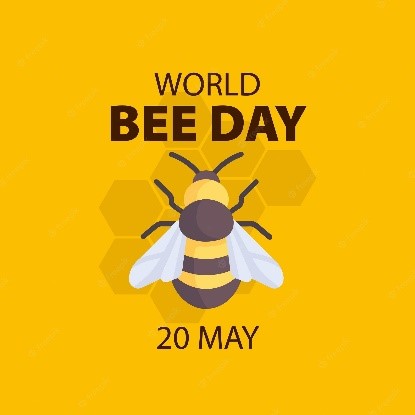Description

Disclaimer: Copyright infringement not intended.
Context
- The Ministry of Agriculture and Farmers Welfare (MoA&FW), Government of India is celebrating World Bee Day.
Details
- World Bee Day is celebrated on May 20. On this day Anton Janša, the pioneer of beekeeping, was born in 1734.
- The purpose of the international day is to acknowledge the role of bees and other pollinators for the ecosystem.
- The UN Member States approved Slovenia’s proposal to proclaim 20 May as World Bee Day in December 2017.
India’s National Beekeeping Mission
Keeping the importance of beekeeping in mind, a lot of efforts have been /are being made by the Ministry of Agriculture and Farmers Welfare, Government of India, which includes the "National Beekeeping and Honey Mission (NBHM”
About
- National Beekeeping & Honey Mission (NBHM) was launched as a component of the Atma Nirbhar Bharat packageby the Union Government in 2020.
Funding
- It is a Central sector scheme and 100 percent funded by Central Government.
Objective and Execution
- It is launched to achieve the objective of the “Sweet Revolution,” which is being executed by the National Bee Board (NBB); and National Beekeeping & Honey Mission seeks to promote and improve scientific beekeeping nationally.
Ministry
- The Ministry of Agriculture and Farmers’ Welfare, Government of India, is in charge of the NBHM.
Implementation
- The National Bee Board (NBB)is implementing the NBHM, which has been given permission to run from 2020 to 2023.
- In order to accomplish the goals of the Sweet Revolution, the project aims at the general advancement and promotion of scientific beekeeping in India.
Collaboration
- The programme will collaborate with a number of other beekeeping initiatives, including the KVIC Honey Mission, the Mission for Integrated Development of Horticulture (MIDH), and programmes from the rural development, MSME, AYUSH, commerce and industry, tribal affairs, etc.

Objectives of National Beekeeping & Honey Mission (NBHM)
- Encourage the industry’s overall expansion to generate revenue and jobs for households with and without farms.
- Increase agriculture and horticultural output.
- Establishing Integrated Beekeeping Development Centers (IBDC)/CoE, bee illness diagnostic labs, honey testing labs, custom hiring centres, nucleus stock, Api-therapy centres, bee breeders, etc. is part of developing infrastructural facilities.
- Create a blockchain/traceability system for the source of honey and other goods from beehives, and use IT technologies for beekeeping, such as online registration, etc.
- Encourage agri-startups and agri-entrepreneurs to engage in beekeeping and honey production.
- Encourage traders/exporters and beekeepers to enter into trade partnerships.
- In order to produce honey and other high-value beehive products, the beekeeping sector must foster, develop, and disseminate the most recent and cutting-edge technologies.
- Encourage beekeepers by providing an institutional framework for a group effort, such as SHGs, FPOs, etc.
- Increase the benefits of beekeeping’s diversification on the economy, society, and environment by producing more honey of high quality and quantity for both domestic and international markets,
- To produce other high-value beehive by-products like beeswax, royal jelly, propolis, comb honey, and bee venom.
Implementation of National Beekeeping & Honey Mission
- It is divided into three mini-missions for implementation. These are Sub-Mission I, II, and III that make up the National Beekeeping & Honey Mission (NBHM).
- Sub-Mission I:In this sub-mission, the emphasis is on increasing crop yield and productivity through pollination with the help of scientific beekeeping. Its purpose is to raise public knowledge of scientific beekeeping.
- Sub-Mission II: The management of beekeeping and beehive products after harvest is the main topic here, including collecting, processing, storage, marketing, value addition, etc.
- Sub-Mission III: In this submission, the emphasis is on developing research and technology for various states and regions, as well as for various agro-climatic and socio-economic situations.
Significance of Beekeeping in India
- Beekeeping offers numerous advantages to farmers, the economy, and the ecosystem as a whole.
The advantages of the mission include:
- Produce including fruits, vegetables, oilseeds, lentils, etc. are produced in greater quality and quantity thanks to pollination help.
- It aids in environmental and agricultural sustainable development.
- Moreover, it helps to keep biodiversity intact.
- It is a low-cost technology that is a crucial input in agriculture.
- Furthermore, it provides a means of support and creates jobs.
- It aids in raising the level of living and increasing the revenue of farmers.
- Pollination, which is necessary for the growth of further plants, animals, and ultimately life on Earth itself, is impossible without bees, bees are crucial to the environment.
Closing Remarks
- Bees are renowned for their role in providing high-quality food and other products used in healthcare and other sectors but the work of bees entails much more.
- Effective pollination increases the yield of agricultural produce and improves its quality.
- Beekeeping in India is thus an important agri-business activity that not only promises good returns to the farmers but also helps increase agricultural productivity leading to food and nutritional security in the country.
|
PRACTICE QUESTION
Q. Consider the following statements:
1. National Beekeeping & Honey Mission (NBHM) was launched as a component of the Atma Nirbhar Bharat package by the Union Government in 2020.
2. The National Bee Board (NBB) is implementing the NBHM in order to accomplish the goals of the Sweet Revolution, and it is a Centrally Sponsored Scheme.
Which of the above statements is/are true?
(a) Only 1
(b) Only 2
(c) Both 1 and 2
(d) Neither 1 nor 2
Correct Answer: (a) Only 1.
|

https://pib.gov.in/PressReleaseIframePage.aspx?PRID=1925502










